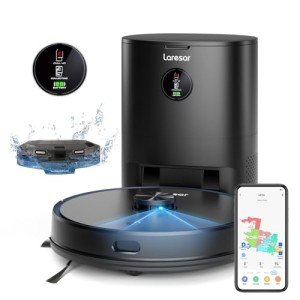The One Robotic Vacuum Mistake That Every Newbie Makes
The Rise of Robotic Vacuums: Transforming Home Cleaning
In the modern-day age, convenience plays a critical role in the way we handle our homes. Among the most considerable innovations that have transformed home cleaning is the robotic vacuum. These autonomous gadgets have gotten tremendous appeal for their ability to browse through homes, getting debris and dust with minimal human intervention. This post offers an extensive take a look at robotic vacuums, their features, advantages, and factors to consider for potential purchasers.
Understanding Robotic Vacuums
A robotic vacuum is a compact, self-operating cleaning device created to autonomously tidy floorings. Running within robot vac and mop -programmed pattern or path, they use various sensors to browse their surroundings, avoiding barriers and effectively covering floor space. Robotic vacuums can be found in numerous models, each catering to different cleaning needs and environments.
Key Features of Robotic Vacuums
Feature
Description
Navigation System
Uses sensing units (like LIDAR, infrared, and video cameras) to map and browse a space.
Suction Power
Differs in between designs; important for efficient cleaning on different surface areas.
Battery Life
Period the vacuum can run before requiring a recharge, typically ranges from 60 to 120 minutes.
Dustbin Capacity
Size of the dust bin, affecting how typically it needs to be emptied, usually ranges from 0.3 to 1 liter.
Smart Features
Consists of scheduling, mobile phone integration, and voice command compatibility with devices like Amazon Alexa or Google Assistant.
Height and Design
Impacts the capability to fit under furniture; most robotic vacuums are around 3-4 inches high.
Advantages of Using Robotic Vacuums
Robotic vacuums use a myriad of advantages, enhancing the lifestyle for users. Here are some of the essential advantages:
- Time-Saving: By automating the cleaning process, users can maximize time for other essential activities.
- Consistency: Robotic vacuums provide regular cleaning schedules to maintain cleanliness, decreasing dust build-up.
- Accessibility: They can quickly access tight areas under furnishings where conventional vacuums might have a hard time.
- Advanced Technology: Most modern-day models come equipped with cutting-edge navigation and cleaning innovations for effective operation.
- User-Friendly: With mobile apps and voice controls, operating robotic vacuums has actually never ever been easier.
- Remote Monitoring: Many models permit users to keep an eye on cleaning progress and change settings from another location.
Factors to consider Before Purchase
While robotic vacuums can substantially streamline home cleaning, potential purchasers need to be conscious of their restrictions and crucial factors to consider:
- Cost: Robotic vacuums can differ commonly in cost, from economical choices to luxury models with advanced features.
- Cleaning Power: While efficient for light particles, they may deal with heavy dirt or carpets compared to traditional vacuums.
- Upkeep: Regular cleaning of the gadget itself (e.g., clearing dust bins, replacing filters) is vital for ideal performance.
- Home Layout: Homes with complicated designs or lots of challenges may need designs with advanced navigation innovation.
- Battery Life: Consider the size of your home and whether the vacuum can complete its cleaning cycle without requiring a recharge.
Popular Robotic Vacuum Models
Numerous designs have actually emerged on the marketplace, each offering special functions and capabilities. Here's a look at some of the most popular robotic vacuums in 2023:
Model
Key Features
Price Range
Roomba s9+
Excellent suction power, self-emptying
₤ 999 – ₤ 1,199
Roborock S7
Mopping capability, wise mapping
₤ 649 – ₤ 749
Eufy RoboVac 11S
Affordable, slim design
₤ 199 – ₤ 299
Neato D8
Special D-shape for corners, strong suction
₤ 499 – ₤ 599
Dyson 360 Heurist
Advanced mapping, powerful cleaning
₤ 999 – ₤ 1,200
Often Asked Questions (FAQs)
Q1: How do robotic vacuums work?
Robotic vacuums utilize sensors and mapping innovations to browse and tidy floors. They often have pre-set schedules and can go back to their docking stations to charge when required.
Q2: Do robotic vacuums clean efficiently on carpets?
High-end robotic vacuums with strong suction abilities are designed to work on carpets. Nevertheless, for deep cleaning, a traditional vacuum might still be required regularly.
Q3: How typically should I utilize a robotic vacuum?
A lot of users find that running their robotic vacuum every day or every other day keeps their spaces tidy and manageable.
Q4: Can robotic vacuums be used on numerous surfaces?
Yes, many robotic vacuums are created to transition seamlessly between floors, carpets, tiles, and hardwoods.
Q5: Are robotic vacuums loud?
Generally, robotic vacuums operate at a lower noise level compared to conventional vacuums. Sound levels can vary by design, so taking a look at user evaluations might assist identify what to anticipate.
Q6: Is a robotic vacuum worth the investment?
This depends upon your lifestyle and cleaning habits. For hectic households or those seeking benefit, the investment in a robotic vacuum can significantly improve cleaning efficiency.
As technology continues to progress, the vacuum market is significantly accepting the convenience and innovation of robotic cleaning services. Robotic vacuums not just relieve users of routine cleaning jobs but likewise offer sophisticated functions targeted at making cleaning effective and straightforward. Whether you are a veteran admirer of tech gizmos or simply seeking a method to preserve tidy floorings with minimal effort, a robotic vacuum may prove to be a deserving investment for your home.
